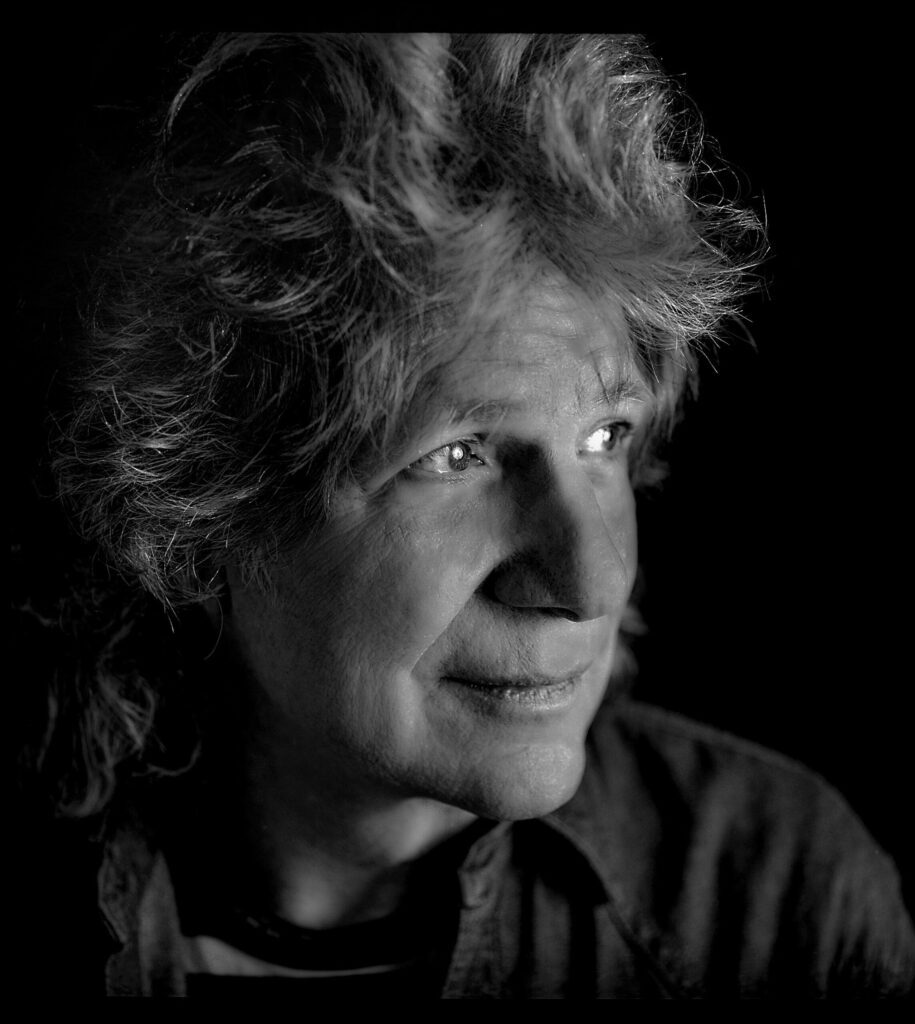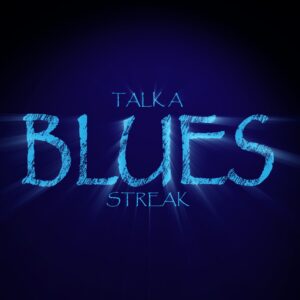The 2025 "Horace Monster Interview"
The following is the complete 2025 interview, in its entirety unredacted and unedited. Questions and answers for a feature article in a long running column for a major Chicago entertainment publication. It remains unpublished.
Q: Where were you were raised?
Billy Prewitt: Well Steve, as my documentary starts out with the tongue in cheek humor “I was born a white boy in Buffalo New York in 1945.” Growing up as a teenager I always liked black music especially what I heard on the AM radio. I heard the songs that were magic to me like “Get a job,” “Book of Love” & “Stay” by the late Maurice Williams and The Zodiacs. That all comes to mind as the first songs that gave me chills. It was so much better than Pat Boone singing “Tutti Frutti” when you could listen to the real thing by Little Richard!
Q: What were your childhood & teen musical loves, early influences and training? Your first instrument?
Billy Prewitt: I never had any “music lessons” or support from my parents since they said rock and roll was just a phase and would be gone in a year or two, but I knew better. The first 45 record that I bought was “Peggy Sue” and when I heard the magic Harmony of the late Everly Brothers that did it and I was committed. I didn’t know why it sounded so magical but much much later on when I started to develop an ear for music, I realized that it was the spellbinding “sibling” harmony. But at the time I was just learning my first E chord on guitar that my sister showed me before she passed away. She and I used to sing together and I didn’t realize it then, but it was the magic of siblings that naturally form words the same way and have the same timber in their voice that made it so captivating. It was like “unison in harmony” to quote a phrase from my friend the late Lowell George. That story is in the 1st episode of my podcast,”Talk a Blues Streak“.
Q: What were your first bands and musical endeavors?
Billy Prewitt: The first band that I can remember was with my buddy in high school, a guy named Mike Lipman. He is still a dear friend today, plays music, and lives in the music capitol of Nashville. We used to jam in his basement and have these little parties with the neighborhood kids to show off our brand-new electric guitars. Mine was a Strat that I was so proud of. At the time we were in 10th grade going to Westside High School in Omaha Nebraska. Then we expanded the band and added another guy the late Rick Redemski. We really thought we were getting somewhere when Westside High School asked us to play in some sort of football parade on a float in 1962. It was a little flatbed trailer being towed by a station wagon, and we played “Green Onions” for 3 hours just like the record. One of the guy’s proud dad was driving and he kept stopping and starting quickly, which caused the drummer to keep falling off his stool, but we had fun. It was the first time our guitar amps were outside so we tried to turn them all the way up to 11, and there was some kind of generator to provide electricity to the amps with a terrible buzz. We didn’t care because the buzz was free and it sounded great to us. That was the first time I really felt like something and realized that this is something cool that I could do the rest of my life, as we waved to the crowds along the downtown streets like Queen Elizabeth. 79 years later I’m still kicking so I guess I was correct in thinking music would become a part of my life.
Q: When and how did Horace Monster form?
Billy Prewitt: Actually it was a little complicated. I had an idea for a new band, we were going round and round trying to figure out a name. I was established and had more experience, we decided to call attention to part of my unusual name “Horace William Prewitt III”. I had already toured with Otis Rush so they figured that Billy Prewitt must be a monster guitar player, and Horace Monster was born. As the original founding member, the band was going to be all about having fun, being creative, honesty, and being upfront about everything. We were young, strong, and excited. So, I declared Horace Monster to be a collective democracy where everybody had an equal vote and everybody could do what they wanted so there wouldn’t ever be any conflicts. I was naive and had no idea what was yet to come.
We were on fire and wanted to come on strong; so we came up with the best new instruments we could afford. I had a wonderful doctor who believed in me and would treat this hippie kid for free. I asked him to co-sign so I could buy a brand-new state of the art Marshall amp. The late Dr. Ricardo Benvenuto was anxious to hear this new band he was subsidizing. The drummer came up with a huge drum kit with more pieces than would fit on a drum stage, and I remember the keyboard player had I think a Hammond M-2 then upgraded to a very used 425-pound Hammond B3. We never had roadies so we learned to lift.
Q: Where and when did you gig?
Billy Prewitt: One of the very first jobs that I booked was at a club called The Cedar Tap in Michigan City Indiana during the brutal winter in January 1972 with record snowfall. We were the first band ever booked in the club so we rented a van from Budget that ended up having no heat during the blizzard, and then getting stranded at a rest stop in the deep snow. We panicked, called the Cedar Tap and they came to rescue us. It was almost midnight when we finally got to the packed club and the audience cheered as we walked in and set up. That club became one of our regular homes to play with many return dates. The Cedar Tap was good to us having continuous bands for over 50 years and finally closed in December 2024.
Thinking back, we just wanted to play anywhere and everywhere so I booked the band for any amount of money, even at high schools for free. We played some college gigs all the way down to very small bars with no stage where there was always a volume complaint issue. We didn’t care because we were a close alliance of brothers that were determined to always stick together and earn our way to the top at any cost.
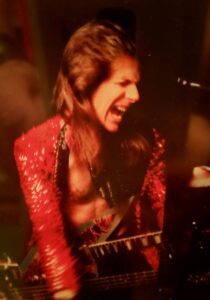
In the mid-seventies Horace Monster really caught on and we became I guess what you would call “Bar Stars”. When local agents were mentoring brand new young bands they would tell the new band to come up with a great name like “Horace Monster,” even though I thought it was sort of silly and didn’t take the name too seriously. During one of those early years the Chicago Reader’s annual poll voted us one of the most popular club acts in town. That was a great honor since the list of local bands included names like Styx, REO Speed Wagon, and a funk band named Rufus who had an unknown singer who later changed her name to Chaka Khan.
A few years earlier I had bravely moved to Chicago not knowing what was in my future, because I was already hooked on Blues after hearing the very first Paul Butterfield album. Shortly after arriving the great blues legend Otis Rush asked me to join his band around 1966 or so, only 4 years after this self-taught kid playing that amateur flatbed parade concert. Otis and I played the very first Ann Arbor Blues festival in 1969. I loved the gigs in the blues bars where I would proudly stand in his shadow. He taught me how to play lead guitar and I will forever be grateful. I toured with him for the next few years. (Podcast Episode #5). After hearing Hendrix and Harvey Mandel I wanted to sound more electric like a rock band; so that is when I formed Horace Monster. In my wildest dreams I couldn’t have envisioned that Harvey Mandel would take my place when I left the “Acme Thunder Band” years later that were previously the late “Aliotta, Haynes & Jeremiah” in the 80s.
Q: Can you remember any notable or funny gigs?
Billy Prewitt: I recall one funny gig that we actually created when the original 4-piece Horace Monster (the 1st version) was together in the very beginning. Ultimately the 1st version was together a total of about 7 years and lots of our gigs were funny and creative. When we were just starting out the four of us just didn’t have enough gigs and we were anxious to get out and get noticed. We thought the easiest way to get some free publicity was to simply get arrested. After all, it had already happened to Mick Jagger and Jim Morrison. So, I came up with this idea to play the island in Chicago’s Lincoln Park Lagoon without a permit! If we could gather a crowd and cause a ruckus, then the police would surely come and they would arrest us. I put the plan in motion. Our biggest fan was my buddy Tom Poloway and I set everything up so that when a crowd gathered he would go to a phone booth and drop a dime on us since there were no cell phones back then. Calling the police and in a frantic voice he would say something like “there is some outlaw band playing in the middle of the lagoon really loud…something big is getting ready to happen here…probably big trouble… It’s getting out of control….you guys better get down here right away”. We pictured ourselves getting photographed with handcuffs on, being put in a paddy wagon, then featured on the front page of the Chicago Tribue and magically becoming some kind of local celebrities. There’s no way this won’t work, I was thinking what a genius idea!
At 5 AM on a hot August morning we all met at the lagoon and used little aluminum row boats to slowly and quietly shuttle the equipment, load by load, out to the island. Imagine us rowing by hand, an organ, guitar amps, drums, and a PA with a generator for electricity that I remembered from my High School parade. In the dark we quietly set up the mics in the mud, plugged everything in and by sunrise when we fired up the generator and started playing, the banks of the lagoon were full of hundreds of people, like a REAL concert!
So we played a couple of hours, absolutely every song that we knew, with lots of people sitting on the grass listening and having fun, applauding loudly after every song. The plan was panning out and when the police finally came, Tom went up to the cops and asked “are you going to arrest them?” Tom explained that the band didn’t even have a permit required by law, and it looks like that unknown lawbreaker band seems to be smoking marijuana right in front of everybody. The sergeant just put down his binoculars said “who cares, it looks like everybody is having a good time” and they just sat there in the squad cars with the car doors open and listened until the generator providing our electricity ran out of gas….. o well….sadly we couldn’t even get arrested! Scratch that idea, but we did get a lot of good photos for an 8 x 10 PR collage that is still floating around.
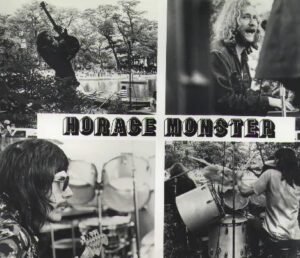
Q: Any tours?
Billy Prewitt: We were unstoppable and kept playing as far North, from Marquette Michigan, as far South to Florida, and as far West to Davenport Iowa. We were chiseling away one gig at a time.
Q: Where and when did you record?
Billy Prewitt: We were determined to get stuff out there but we couldn’t afford to actually buy studio time, so we came up with a state of the art 4 track open reel tape recorder (the biggest home machine available at the time). We used to record original stuff in the living room of some friends we had in Highland Park. We would do “take after take” of just improvising heavy electric grooves and make up words as we went. Some stuff started to come together and I said “if we just keep throwing enough crap on the wall, some of it will start to stick”. But the fact is that we didn’t know how to get what was called a “record deal” in those days. It was very different back then in another century, compared to streaming today when artists are able to get material out there overnight online worldwide.
Q: How many releases did you have and what are they?
Billy Prewitt: More than a decade later when Horace Monster finally evolved into a power trio, I started Monster Records. The band then became another recording version of Horace Monster with Dennis Johnson on bass …and Gary Smith on drums. They were the founding members of the original “Survivor” and “Chase”. We recorded a lot of songs that I wrote at Tanglewood Recording Studios including “Feels Like Gold” and “Black Widow”.
Then Dennis Johnson….did a fabulous job of producing another singles that we released called “Goin’To Mexico”, “Mama Don’t Like It” and a cover of “Hang on Sloopy”. Everything was pressed on 45 records with color graphics. Today Dennis and Gary are playing better than ever and we are still good friends.
Q: When were the releases recorded and released?
Billy Prewitt: During that same period of time, we did the 3 records that are online at the “Discogs” website. I still have boxes of pressings stored in my archive.
Q: What led to the end of Horace Monster and when was the end?
Billy Prewitt: Well, that’s a good question Steve that I am still asking myself over 50 years later. If you really want to know the inside story from the horse’s mouth that has never been told, I’m finally willing to tell it.
The longer we were together the stronger I felt the bond to my bandmates. I was so happy to be a part of something that brought me joy and had so much magic that seemed meant to be. How could I be so lucky to have just fallen into such an enchanted magical group of musicians that were spreading good will with each gig. I had unconditional respect for all of them. It is no wonder that we were going to be bonded and closest of friends for life…forever! I’m not religious but in my mind it must have been some kind of greater power that brought us together. But to do something that you love and actually get paid to do it was simply mystifying.
Our loyal fans would often comment that we generated so much happiness, they were envious of how we looked on stage when we were having so much fun. We had enough money to keep doing what we loved year after year and maintain our equipment to what we considered “state of the art”, and eventually even buying a big band truck. When we gigged out of town to save money we would sometimes sleep in the band truck and we really thought that we were living high on the hog. When we were sleeping in the truck and the sun would come up in the morning, we would wake up to a muggy 110 degrees inside truck since there was no ventilation. It didn’t matter…..all for one and one for all….we were determined to make It at any cost. I always ran the band as a democracy and everybody had an equal vote so that the band was happy and we were all secure. I knew that there would never be any surprises and we would be together forever. We had strength in numbers because we knew “United we stand, divided we fall.”
At the time I was oblivious to the fact that the other successful local bands, as well as national acts didn’t operate like that. They were autocratic bands that had a single decision maker holding most of the creative control. But I didn’t care because I loved my bandmates who were now soul mates and I would never let anything get in the way of what was going to be a lifelong bond, no matter what happened. Nothing was going to get in the way of this unconditional camaraderie…Nothing…or so I thought!
Horace Monster played for years, so happy in every kind of venue you could imagine. Life was just getting better and better being leader of an increasing well-known band and to think that I was self-taught and still making great music. Every set we played had “flash powder” endings and we even had “Money Cannons” that fired out our unique rock and roll money that we had printed which had our schedule on it. Sometimes the fans could trade in the rock and roll money at the bar for free drink credit and I would settle up with the owner at the end of the night when I got paid to pay for the fan credits.
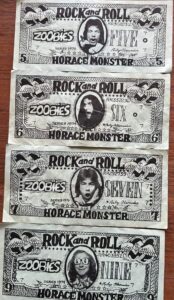
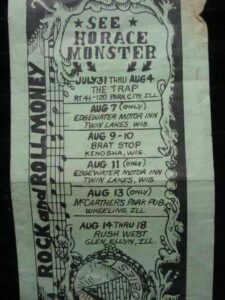
We were full of new ideas like our double neck guitars. Bob and I would alternate switching off playing lead and bass and when we were both playing lead (sometimes on the same guitar), the keyboard player would cover the bottom end by playing a Fender Rhodes keyboard bass, and sometimes even lighting the organ on fire with lighter fluid. We had a big sound coming from a little 4-piece band. I designed my 40-pound lightning bolt guitar that is still hanging on my living room wall.
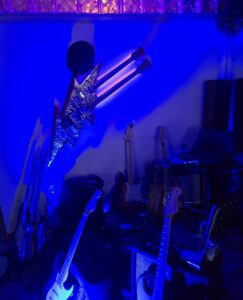
A cool set ender was Bob and I playing my lightning bolt at the same time on the same guitar, then rolling backwards together into a slow somersault, guitar and all. It sounded like a train wreck but the audience loved it! Nobody else was doing that kind of stuff back then and I was so proud to be doing something very different from what the other bands were doing. The agents began to notice us and I formed a great friendship with all the mainstream Chicagoland club owners where we were playing. I was doing all the booking and the owners knew that Horace Monster was the most reliable band in town who never cancelled a date for any reason. When I booked a date it was “etched in stone” and we had unconditional trust in each other. Toward the end we didn’t even need contracts, just a handshake when together we marked “Horace Monster” in ink on our personal calendars.
At that time I had moved into my small 1966 Dodge van as my permanent residence to save money. Spending 2 Chicago winters I called it “city camping” that to me seemed like a fun adventure. Anywhere I parked and turned off the engine I was home! For me it was reminiscent of having the military discipline that I had learned when I was in the Air Force. (Episode #3 of “Talk A Blues Streak” podcast)
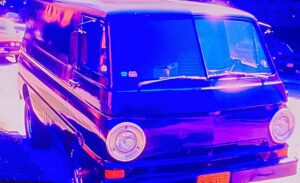
In retrospect I’m guessing that around this time my band must have thought that I was somehow withdrawing and becoming more and more distant. On the contrary the freedom of living in my van inspired me and I was actually writing lots of songs on my acoustic guitar and couldn’t wait to unveil them. Perhaps my band thought that I was planning some kind of solo career and they better beat me to the punch and cover themselves before they were out of a job. I thought I knew them well but it’s hard to know what they might have been thinking.
Still, I was trusting and naïve and I didn’t see a storm brewing above. Then without my knowledge there seemed to be rumblings in the ranks. For some reason, I still can’t figure out, they wanted to play hard ball and assume total control of the group. At that time the guys for some reason thought that “back stabbing” was now in fashion and really a cool thing. They may have been influenced by events like John Fogerty leaving Creedence Clearwater high and dry as well as multiple guitarists leaving Lynyrd Skynyrd. Extreme measures to get ahead at any cost seemed to be their new mission.
Their first step was cleverly trying to get me to quit the band by calling a prearranged meeting on the premise of a “strategic planning session” by yet another “wanna be” manager to insult and belittle me in front of my bandmates. Collectively they said my influences of the musicians that I respect are in bad taste to try to make me feel ashamed. They were referring to my idols like Harvey Mandel and all my black blues influencers that inspired me and I emulated. My bandmates laughed at me and said I should be emulating people with a completely different direction that they wanted to hear like John McLaughlin and Al Di Meola, but I stayed true to myself and stood my ground because I believed different musical influences result in a more interesting and innovative output.
Their next subversive strategy was to get me to agree to use a REAL “booking agent” to book gigs since he might do a better job of finding new places to play. That seemed like something reasonable to try and since I suspected nothing I agreed. Their long-premeditated plan was in motion and ready to execute while I was clueless simply lost in my happiness.
Since trying to get me to quit didn’t work, running out of ideas and unbeknownst to me they pulled the trigger on their final one. In a very agressive move, they decided to kick Horace out of Horace Monster, but still planned to keep the band name since Horace Monster was already established and had a great track record. Because I was always brutally honest with them about everything, so they knew that I had not copyrighted or filed a trademark registration for the band name. They interpreted my unconditional trust for weakness. I never would have suspected they would do something as brutal as this, but I later learned that it was planned many months in advance. Maybe they thought that nobody would notice that Horace wasn’t in Horace Monster any more!
One night after a great gig in the middle of January during a snow storm way up at the top of the state in Marquette Michigan, we took the long ride back to Chicago after loading up the truck. The usual friendly conversation and critique of the last gig we usually talked about on the van ride back home had suspiciously stopped. Nobody would make eye contact with me and I suddenly felt like I was on the outside looking in and didn’t know what was going on. When we got back to Chicago I turned on the heat in my comfy van and crawled in to go to sleep. There was a loud knock on the van back door when yet another new almost agent squeezed into my van and said we have to talk. He was shaking and sweating and I asked him if he was sick. Choaking up he could hardly talk, then he finally got his words out as I tried to comfort him with my hand on his shoulder. He held his breath then gathered his courage announcing that the band was kicking Horace out of Horace Monster. I asked him why we all couldn’t simply sit down at a table for 10 minutes and let the other guys just tell me what’s going on. After all, we were bonded friends for life after the last 7 years of brotherhood sharing our deepest thoughts and secrets, making a living together and always looking out for each other. He said no, “they don’t want to talk to you” as he abruptly left. I was confused, blindsided, and heartbroken after being unceremoniously sacked and sabotaged. That was the last time I ever talked to any of them since that just didn’t seem to be the kind of thing that close friends do to close friends. Who does that??
Trying to make sense out of everything and thinking back, I realized that for one thing with only land telephone lines in those days, there was really no good way to communicate and stay on top of things. I realized that Horace Monster’s new inexperienced agent had been hired behind my back long before I had agreed. The band’s calendar was full for the future months and when I would ask for new dates they said “don’t worry about it” because we should take some time off to write some new songs. It turns out that each club that I had worked so hard establishing a working relationship with each club owner had been completely derailed and unsalvageable. The new agent had booked new jobs but did not tell the club owners that I was now out of the band. It was only obvious at show time as they burned out each gig one by one. I was in a powerless position as they played each club date, not being able to re-book future return gigs without Horace. The story that I got much later was when the club owners asked where Horace was, without missing a beat the snippy agent answered that I had simply lost interest and had quit playing music. To this day I have no idea what members were in that version of the band since I had never met any of them.
Reminiscing now I think the saddest thing about their collective decision to burn all those bridges was that today we still could be playing summer festivals of original local nostalgia revival bands. Current agents still call me to tell me we were a strong enough local force to do these gigs. They ask me if there is any chance they could book the original Horace Monster with the original members? They say the money would be great and give the examples of mostly still working groups for special occasions and nostalgia concerts ..AKA: “Shadows of Night”, “REO Speedwagon”, “Cryan Shames”, “The Buckingham’s”, “The Flock”, “Ides of March”, “New Colony Six”, “Mason Profit” “Styx” and of course “Cheap Trick” who we used to alternate sets with at a place called the Night Gallery in Park City until 5 AM back in the day in a different century.
After getting sacked I wasn’t fond of band mentality so I played my songs acoustic solo alone in small restaurants, while the new band without Horace burned the bridges for return dates that ran out in about a year. But playing solo, I missed the electric music and especially playing lead guitar and blues harmonica.
Q: Tell me about the second lineup of Horace Monster, maybe restarted in the 80s as per your you tube video I saw from 1981.
Billy Prewitt: Well, I guess you would call this the beginning of the 3rd lineup so far. When the dust settled from the coup d’état I decided to lead a new power trio and re-resurrected Horace Monster since it was my name and my concept from the beginning. More importantly I also learned my lesson about my collective way of thinking allowing the band to be a democracy with equal votes. A band that is a democracy simply does not work because it slows progress and pulls the group in different directions without a clear leader to guide the band. I made it clear in the new trios who was the leader and if they wanted to vote, everybody could vote. The only difference was that now my vote was the only vote that counted. I paid the rhythm section different amounts of money and told each band member exactly what they would be getting paid, a technique that I learned from Otis Rush when he paid his band. Surprisingly, in the new hierarchy there were never any questions or problems after that it was more fun.
It was the perfect time to launch a power trio. On the horizon was ”ZZ Top”, “Cream”, and “Hendrix”. The first version of the new power trio was with the late Tommy Palmer on bass with very soulful vocals, and the late Les King on drums. They had been playing together as a power trio in a great band called “Sunday Funnies” so I stole them from that band since they were anxious to be a part of Horace Monster. Another version of the 3-piece power trio was with Tom Hagerty on bass and Jody Jones on drums. Both of them are still playing and we are great friends that I have tremendous respect for. Another version was with Craig Sims on bass and Larry Lamas on drums, still close friends with them too. The 3 piece was a lot of fun for me and we had plenty of gigs taking jobs and competing with groups that had many more members.
Q: What are all members doing now?
Billy Prewitt: If you are asking about the original 4-piece band, in my last conversation with the late Cliff Johnson a few days before he died (leader of Off Broadway), Cliff told me that Bob Harding is living somewhere in Lake Geneva and relocated there to ride on Cliff’s coat tails. I think Bob was with Cliff’s band “Off Broadway” for a very short time because Off Broadway turned over personnel often. Keyboardist Eldon Olmstead I’ve heard he is living in a suburb who offered his apologies for “the part he played in the Horace Monster Coup”. The drummer who was known as Phil Alexander immediately disappeared off of the face of the earth I’m guessing was somehow trying to evade the law. He was always my roommate when we traveled on the road when Horace Monster had enough money to get separate motel rooms, but he was always distant and didn’t disclose much of his personal past always being secretive. I was told that Phil Alexander wasn’t his real name and I don’t know where he is.
Q: Are there any crazy tales of excess? Ha
Billy Prewitt: Yep…a few Ha! I remember one when we had a regular “house gig” back in the day when a band could play all week at one club, one of them being a place called “Grannies” in Glen Ellyn. It was great being house band because we could leave the gear onstage all week and didn’t have to load up every night. One night a gorgeous fan came back to the dressing room and offered to share her doobie with me. Little did I know that it was apparently laced with some sort of animal tranquilizer so unknowingly I took a few tokes. Nobody else in the band would try it but soon my knees were giving way as the club owner came back and said it was time to go up for the last set of the night. Since I had quickly achieved the maximum buzz, couldn’t walk, and I was the lead guitar player my band creatively grabbed a dolly used for the beer kegs and picked me up like a stack of loose pony kegs. They told me to hold on and made a ceremony out of my stage entrance when they wheeled me out through the crowd and lifted me up putting me down on my guitar amp where I wouldn’t fall and hurt myself. The crowd applauded and thought it was part of the act. I counted off the set and let’s just say that I’m glad there wasn’t Facebook live back then. It wasn’t one of my best performances so I was sure not to make that mistake again
Q: Is there any other info that you think is important?
Billy Prewitt: Well Steve, in closing I think there are a few loose ends here worth mentioning, because these days I’m proud to say it has been an interesting journey by having gone “full circle and then some”. From the very beginning starting my musical education being mentored by Otis Rush, then preforming on hi-heeled Rock and Roll shoes, and finally landing back on my feet where I started, and now becoming completely dedicated to blues then and now. I feel really at home with “3 cords and the truth”.
In my travels the late Bobby Enriquez who was a jazz piano heavyweight would ask me when we would jam why I would insist on playing blues licks and simple changes. I would answer that I find beauty in simplicity and uncomplicated, uncluttered honesty in that music. He would answer “Well if you want to stay in 5 grade the rest of your life it is your choice”. But I feel most at home with my blues friends that are mostly black and loyal and I’m happy to stay where I am musically with what I know. They would never execute a coup d’etat on their leader. It is actually the opposite as they simply respect age no matter what the players current ability might be. The guys in my original Horace Monster band used to say my “music theory” was playing “minor cords in a major world” but I was always happy to try to be unique and true to myself. There is nothing like the beauty of repetition. I find it hypnotic!
There is a documentary online about my life that I was lucky enough to win an Emmy award, thanks to producer Hector Perez and executive producer Linda Melazzo. It is the only blues documentary to ever win an Emmy, so I feel extremely honored. All of that information is on my website at BillyPrewitt.com and I love friend requests on Facebook. I’m proud of my podcast too. You can catch it on all major platforms wherever you get your podcasts from if you search for Billy Prewitt or “Talk a Blues Streak”. The episodes are short 20-minute stories sort of like a colorful audio storybook, stopping off at the places I’ve been & everywhere in between that I want to share with everybody. Each episode of the podcast ends with an original song I wrote about the story told. Listen & follow for free with no commercial interruptions. I’ve got 100 episodes in me but I’ll be 80 in August so I’m not sure I can squeeze it all in this life, but check out the existing stories so far.
I have had a great life and I’m grateful for all of the people who have been a part of it, embracing all experiences since those acquaintances have made me the person that I am today. It’s been a fun adventure and today when I am playing live and get a request to play “the best thing Billy Prewitt has ever done,” I say “the best is yet to come.” So here we are over a half century later in 2025 and I guess what goes around comes around. I’ve never carried a scorecard in my wallet but it appears that in my little troop I’m the last one standing. Perseverance goes a long way.
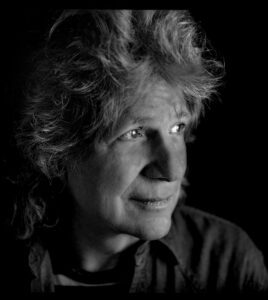
This in-depth interview is for a future issue of the Chicago Reader for a feature article about the Horace Monster band and “The Secret History of Chicago Music.”
Q: Where were you raised?
Billy Prewitt: Well Steve, as my documentary starts out with the tongue in cheek humor “I was born a white boy in Buffalo New York in 1945.” Growing up as a teenager I always liked black music especially what I heard on the AM radio. I heard the songs that were magic to me like “Get a job,” “Book of Love” & “Stay” by the late Maurice Williams and The Zodiacs. That all comes to mind as the first songs that gave me chills. It was so much better than Pat Boone singing “Tutti Frutti” when you could listen to the real thing by Little Richard!
Q: What were your childhood & teen musical loves, early influences and training? Your first instrument?
Billy Prewitt: I never had any “music lessons” or support from my parents since they said rock and roll was just a phase and would be gone in a year or two, but I knew better. The first 45 record that I bought was “Peggy Sue” and when I heard the magic Harmony of the late Everly Brothers that did it and I was committed. I didn’t know why it sounded so magical but much much later on when I started to develop an ear for music, I realized that it was the spellbinding “sibling” harmony. But at the time I was just learning my first E chord on guitar that my sister showed me before she passed away. She and I used to sing together and I didn’t realize it then, but it was the magic of siblings that naturally form words the same way and have the same timber in their voice that made it so captivating. It was like “unison in harmony” to quote a phrase from my friend the late Lowell George. That story is in the 1st episode of my podcast,”Talk a Blues Streak“.
Q: What were your first bands and musical endeavors?
Billy Prewitt: The first band that I can remember was with my buddy in high school, a guy named Mike Lipman. He is still a dear friend today, plays music, and lives in the music capitol of Nashville. We used to jam in his basement and have these little parties with the neighborhood kids to show off our brand-new electric guitars. Mine was a Strat that I was so proud of. At the time we were in 10th grade going to Westside High School in Omaha, Nebraska.
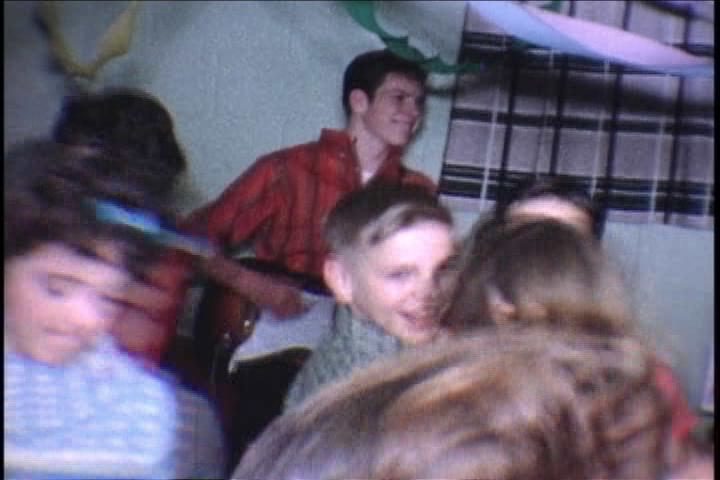
Then we expanded the band and added another guy the late Rick Redemski. It was an unspoken agreement that I was the leader, but we needed a band name and couldn’t think of anything. Mike and I used to cruise the main drag in my 54 Chevy and park in the local drive-in burger joint called Merrill’s Hi-Decker, complete with car hops that would bring the food out on roller skates and put in on a tray on the driver’s side window.
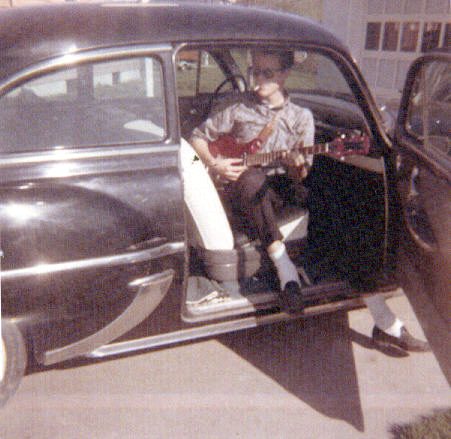
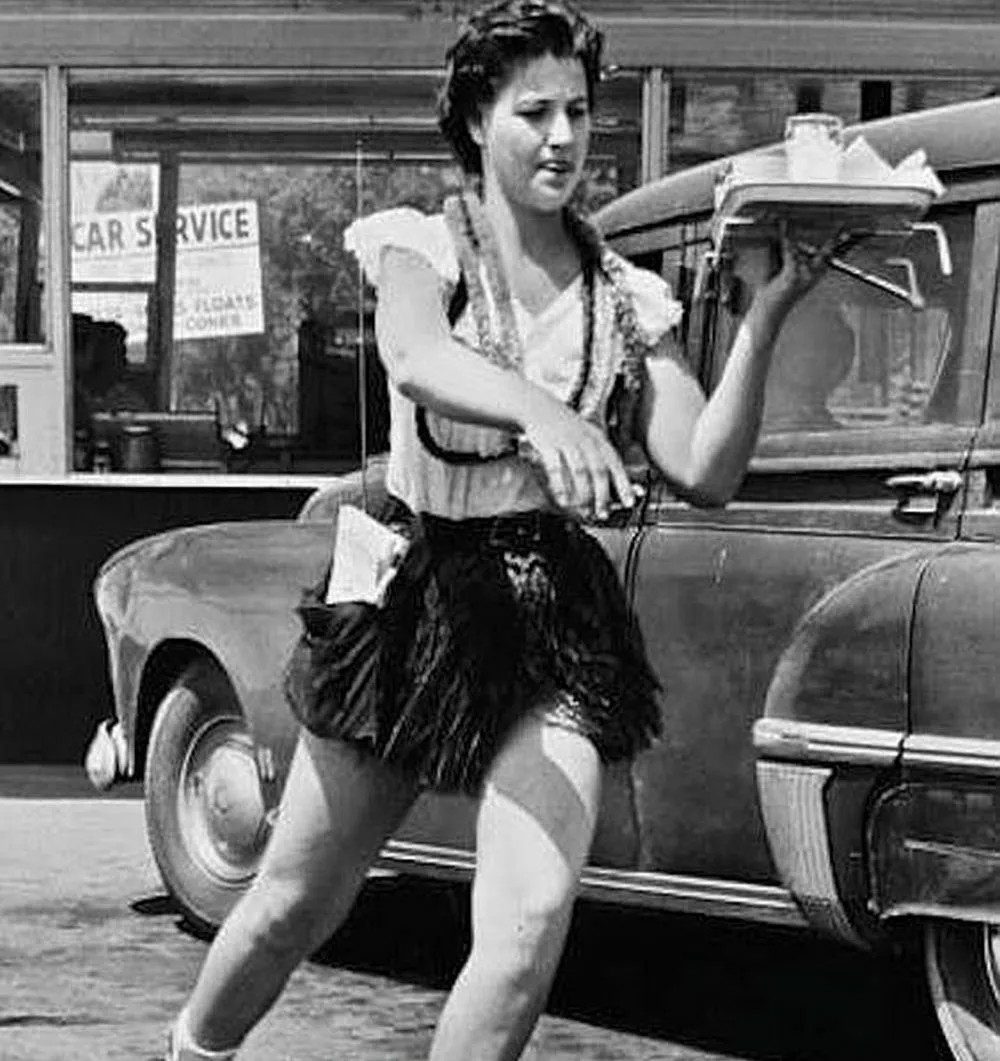
We would sit there in the packed parking lot for hours with the other hot rods and look up at a little glass booth on top of the restaurant listening to a DJ broadcasting live on the AM radio rock station. This new technology was hard to believe and while looking at the neon sign that said “Merrill’s Hi-Decker” I said “how about Bill & The Hi-Deckers”?
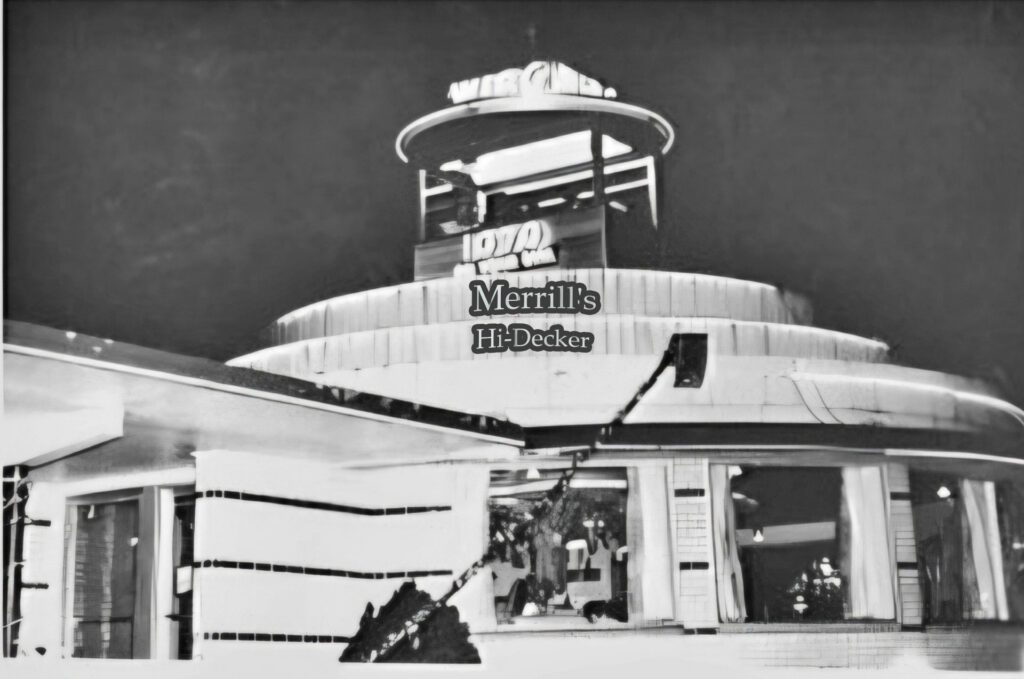
I made a homemade “Bill & The Hi-Deckers” band sign and we really thought we were getting somewhere when Westside High School saw us at a sock hop and asked us to play in some sort of football parade on a float in 1962. It was a little flatbed trailer being towed by a station wagon, and we played “Green Onions” for 3 hours just like the record. One of the guy’s proud dads was driving and he kept stopping and starting quickly, which caused the drummer to keep falling off his stool, but we had fun. It was the first time our guitar amps were outside so we tried to turn them all the way up to 11, and there was some kind of generator to provide electricity to the amps with a terrible buzz. We didn’t care because the buzz was free and it sounded great to us. That was the first time I really felt like something and realized that this is something cool that I could do the rest of my life, as we waved to the crowds along the downtown streets like Queen Elizabeth. 79 years later I’m still kicking so I guess I was correct in thinking music would become a part of my life.
Q: When and how did Horace Monster form?
Billy Prewitt: Actually it was a little complicated. I had an idea for a new band, and once again we were going round and round trying to figure out a name. I was established and had more experience, we decided to call attention to part of my unusual name “Horace William Prewitt III”. I had already toured with Otis Rush so they figured that Billy Prewitt must be a monster guitar player, and Horace Monster was born. As the original founding member, the band was going to be all about having fun, being creative, honesty, and being upfront about everything. We were young, strong, and excited. So, I declared Horace Monster to be a collective democracy where everybody had an equal vote and everybody could do what they wanted so there wouldn’t ever be any conflicts. I was naive and had no idea what was yet to come.
We were on fire and wanted to come on strong; so we came up with the best new instruments we could afford. I had a wonderful doctor who believed in me and would treat this hippie kid for free. I asked him to co-sign so I could buy a brand-new state of the art Marshall amp. The late Dr. Ricardo Benvenuto was anxious to hear this new band he was subsidizing. The drummer came up with a huge drum kit with more pieces than would fit on a drum stage, and I remember the keyboard player had I think a Hammond M-2 then upgraded to a very used 425-pound Hammond B3. We never had roadies so we learned to lift.
Q: Where and when did you gig?
Billy Prewitt: One of the very first jobs that I booked was at a club called The Cedar Tap in Michigan City, Indiana during the brutal winter in January 1972 with record snowfall. We were the first band ever booked in the club so we rented a van from Budget that ended up having no heat during the blizzard, and then getting stranded at a rest stop in the deep snow. We panicked, called the Cedar Tap and they came to rescue us. It was almost midnight when we finally got to the packed club and the audience cheered as we walked in and set up. That club became one of our regular homes to play with many return dates. The Cedar Tap was good to us, having continuous bands for over 50 years, and finally… closed in December 2024.
Thinking back, we just wanted to play anywhere and everywhere so I booked the band for any amount of money, even at high schools for free. We played some college gigs all the way down to very small bars with no stage where there was always a volume complaint issue. We didn’t care because we were a close alliance of brothers that were determined to always stick together and earn our way to the top at any cost.
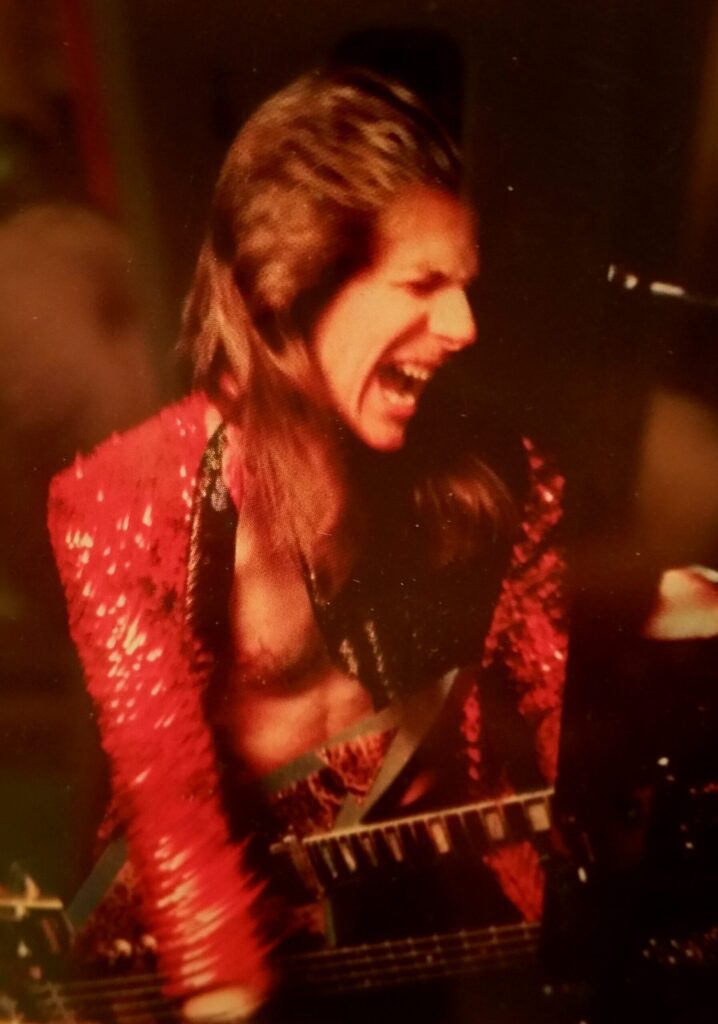
In the mid-seventies Horace Monster really caught on and we became I guess what you would call “Bar Stars”. When local agents were mentoring brand new young bands they would tell the new band to come up with a great name like “Horace Monster,” even though I thought it was sort of silly and didn’t take the name too seriously. During one of those early years the Chicago Reader’s annual poll voted us one of the most popular club acts in town. That was a great honor since the list of local bands included names like Styx, REO Speed Wagon, and a funk band named Rufus who had an unknown singer who later changed her name to Chaka Khan.
A few years earlier I had bravely moved to Chicago not knowing what was in my future, because I was already hooked on Blues after hearing the very first Paul Butterfield album. Shortly after arriving the great blues legend Otis Rush asked me to join his band around 1966 or so, only 4 years after this self-taught kid playing that amateur flatbed parade concert. Otis and I played the very first Ann Arbor Blues festival in 1969. I loved the gigs in the blues bars where I would proudly stand in his shadow. He taught me how to play lead guitar and I will forever be grateful. I toured with him for the next few years. (Podcast Episode #5). After hearing Hendrix and Harvey Mandel I wanted to sound more electric like a rock band; so that is when I formed Horace Monster. In my wildest dreams I couldn’t have envisioned that Harvey Mandel would take my place when I left the “Acme Thunder Band” years later that were previously the late “Aliotta, Haynes & Jeremiah” in the 80s.
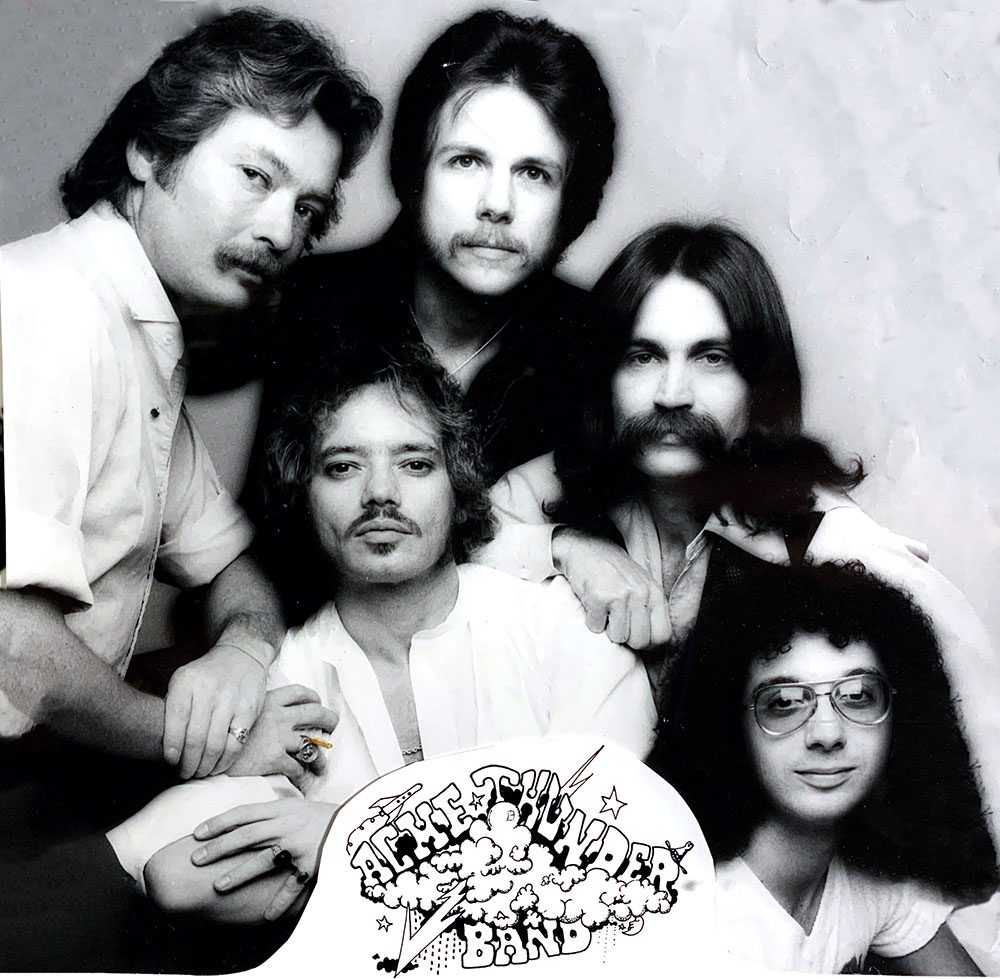
Q: Can you remember any notable or funny gigs?
Billy Prewitt: I recall one funny gig that we actually created when the original 4-piece Horace Monster (the 1st version) was together in the very beginning. Ultimately the 1st version was together a total of about 7 years and lots of our gigs were funny and creative. When we were just starting out the four of us just didn’t have enough gigs and we were anxious to get out and get noticed. We thought the easiest way to get some free publicity was to simply get arrested. After all, it had already happened to Mick Jagger and Jim Morrison. So, I came up with this idea to play the island in Chicago’s Lincoln Park Lagoon without a permit! If we could gather a crowd and cause a ruckus, then the police would surely come and they would arrest us. I put the plan in motion. Our biggest fan was my buddy Tom Poloway and I set everything up so that when a crowd gathered he would go to a phone booth and drop a dime on us since there were no cell phones back then. Calling the police and in a frantic voice he would say something like “there is some outlaw band playing in the middle of the lagoon really loud…something big is getting ready to happen here…probably big trouble… It’s getting out of control….you guys better get down here right away”. We pictured ourselves getting photographed with handcuffs on, being put in a paddy wagon, then featured on the front page of the Chicago Tribue and magically becoming some kind of local celebrities. There’s no way this won’t work, I was thinking what a genius idea!
At 5 AM on a hot August morning we all met at the lagoon and used little aluminum row boats to slowly and quietly shuttle the equipment, load by load, out to the island. Imagine us rowing by hand, an organ, guitar amps, drums, and a PA with a generator for electricity that I remembered from my High School parade. In the dark we quietly set up the mics in the mud, plugged everything in and by sunrise when we fired up the generator and started playing, the banks of the lagoon were full of hundreds of people, like a REAL concert!
So we played a couple of hours, absolutely every song that we knew, with lots of people sitting on the grass listening and having fun, applauding loudly after every song. The plan was panning out and when the police finally came, Tom went up to the cops and asked “are you going to arrest them?” Tom explained that the band didn’t even have a permit required by law, and it looks like that unknown lawbreaker band seems to be smoking marijuana right in front of everybody. The sergeant just put down his binoculars said “who cares, it looks like everybody is having a good time” and they just sat there in the squad cars with the car doors open and listened until the generator providing our electricity ran out of gas…..Oh well….sadly we couldn’t even get arrested! Scratch that idea, but we did get a lot of good photos for an 8 x 10 PR collage that is still floating around.
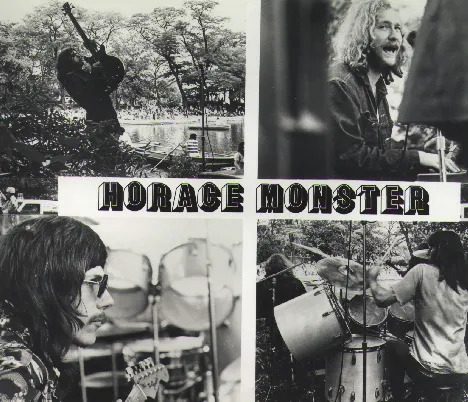
Q: Any tours?
Billy Prewitt: We were unstoppable and kept playing as far North, from Marquette Michigan, as far South to Florida, and as far West to Davenport Iowa. We were chiseling away one gig at a time.
Q: Where and when did you record?
Billy Prewitt: We were determined to get stuff out there but we couldn’t afford to actually buy studio time, so we came up with a state of the art 4 track open reel tape recorder (the biggest home machine available at the time). We used to record original stuff in the living room of some friends we had in Highland Park. We would do “take after take” of just improvising heavy electric grooves and make up words as we went. Some stuff started to come together and I said “if we just keep throwing enough crap on the wall, some of it will start to stick”. But the fact is that we didn’t know how to get what was called a “record deal” in those days. It was very different back then in another century, compared to streaming today when artists are able to get material out there overnight online worldwide.
Q: How many releases did you have and what are they?
Billy Prewitt: More than a decade later when Horace Monster finally evolved into a power trio, I started Monster Records. The band then became another recording version of Horace Monster with Dennis Johnson on bass …and Gary Smith on drums. They were the founding members of the original “Survivor” and “Chase”. We recorded a lot of songs that I wrote at Tanglewood Recording Studios including “Feels Like Gold” and “Black Widow”.
Then Dennis Johnson….did a fabulous job of producing other singles that we released called “Goin’To Mexico”, “Mama Don’t Like It” and a cover of “Hang on Sloopy”. Everything was pressed on 45 records with color graphics. Today Dennis and Gary are playing better than ever and we are still good friends.
Q: When were the releases recorded and released?
Billy Prewitt: During that same period of time, we did the 3 records that are online at the “Discogs” website. I still have boxes of pressings stored in my archive.
Q: What led to the end of Horace Monster and when was the end?
Billy Prewitt: Well, that’s a good question Steve that I am still asking myself over 50 years later. If you really want to know the inside story from the horse’s mouth that has never been told, I’m finally willing to tell it.
The longer we were together the stronger I felt the bond to my bandmates. I was so happy to be a part of something that brought me joy and had so much magic that seemed meant to be. How could I be so lucky to have just fallen into such an enchanted magical group of musicians that were spreading good will with each gig. I had unconditional respect for all of them. It is no wonder that we were going to be bonded and closest of friends for life…forever! I’m not religious but in my mind it must have been some kind of greater power that brought us together. But to do something that you love and actually get paid to do it was simply mystifying.
Our loyal fans would often comment that we generated so much happiness, they were envious of how we looked on stage when we were having so much fun. We had enough money to keep doing what we loved year after year and maintain our equipment to what we considered “state of the art”, and eventually even buying a big band truck. When we gigged out of town to save money we would sometimes sleep in the band truck and we really thought that we were living high on the hog. When we were sleeping in the truck and the sun would come up in the morning, we would wake up to a muggy 110 degrees inside truck since there was no ventilation. It didn’t matter…..all for one and one for all….we were determined to make It at any cost. I always ran the band as a democracy and everybody had an equal vote so that the band was happy and we were all secure. I knew that there would never be any surprises and we would be together forever. We had strength in numbers because we knew “United we stand, divided we fall.”
At the time I was oblivious to the fact that the other successful local bands, as well as national acts didn’t operate like that. They were autocratic bands that had a single decision maker holding most of the creative control. But I didn’t care because I loved my bandmates who were now soul mates and I would never let anything get in the way of what was going to be a lifelong bond, no matter what happened. Nothing was going to get in the way of this unconditional camaraderie…Nothing…or so I thought!
Horace Monster played for years, so happy in every kind of venue you could imagine. Life was just getting better and better being leader of an increasingly well-known band and to think that I was self-taught and still making great music. Every set we played had “flash powder” endings and we even had “Money Cannons” that fired out our unique rock and roll money that we had printed which had our schedule on it. Sometimes the fans could trade in the rock and roll money at the bar for free drink credit and I would settle up with the owner at the end of the night when I got paid to pay for the fan credits.
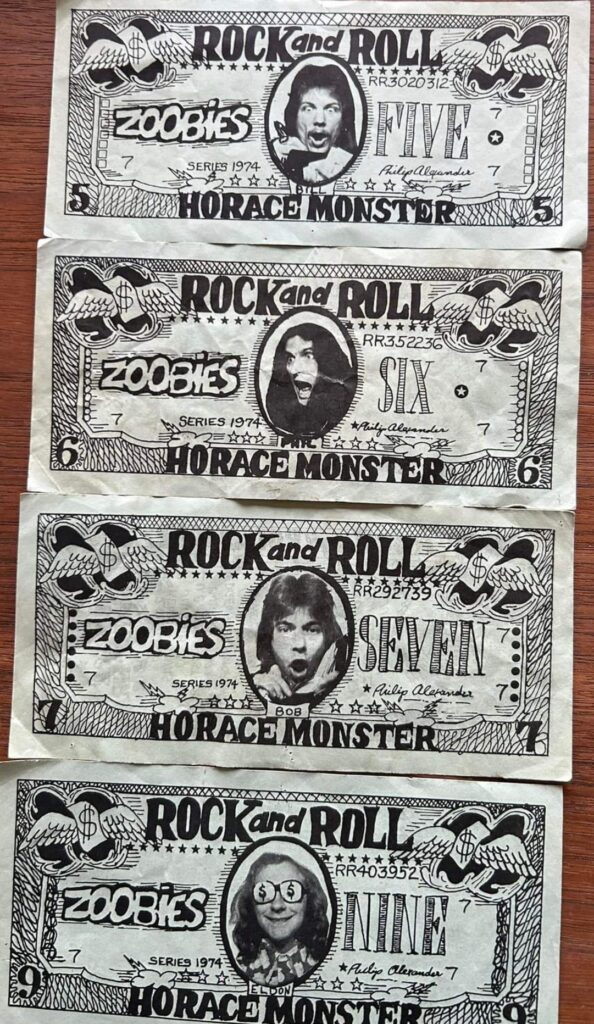
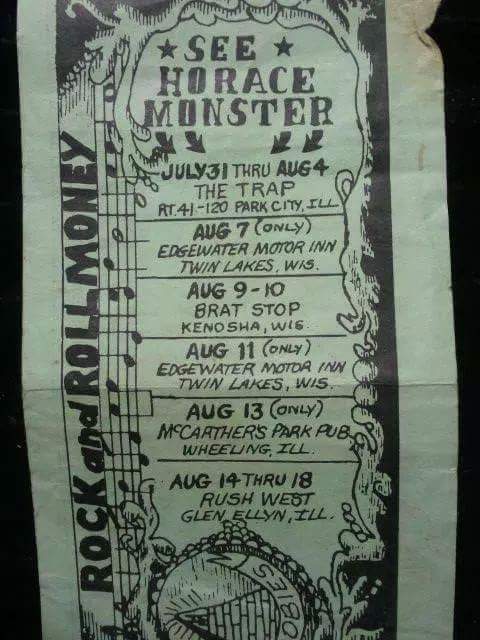
We were full of new ideas like our double neck guitars. Bob and I would alternate switching off playing lead and bass and when we were both playing lead (sometimes on the same guitar), the keyboard player would cover the bottom end by playing a Fender Rhodes keyboard bass, and sometimes even lighting the organ on fire with lighter fluid. We had a big sound coming from a little 4-piece band. I designed my 40-pound lightning bolt guitar that is still hanging on my living room wall.
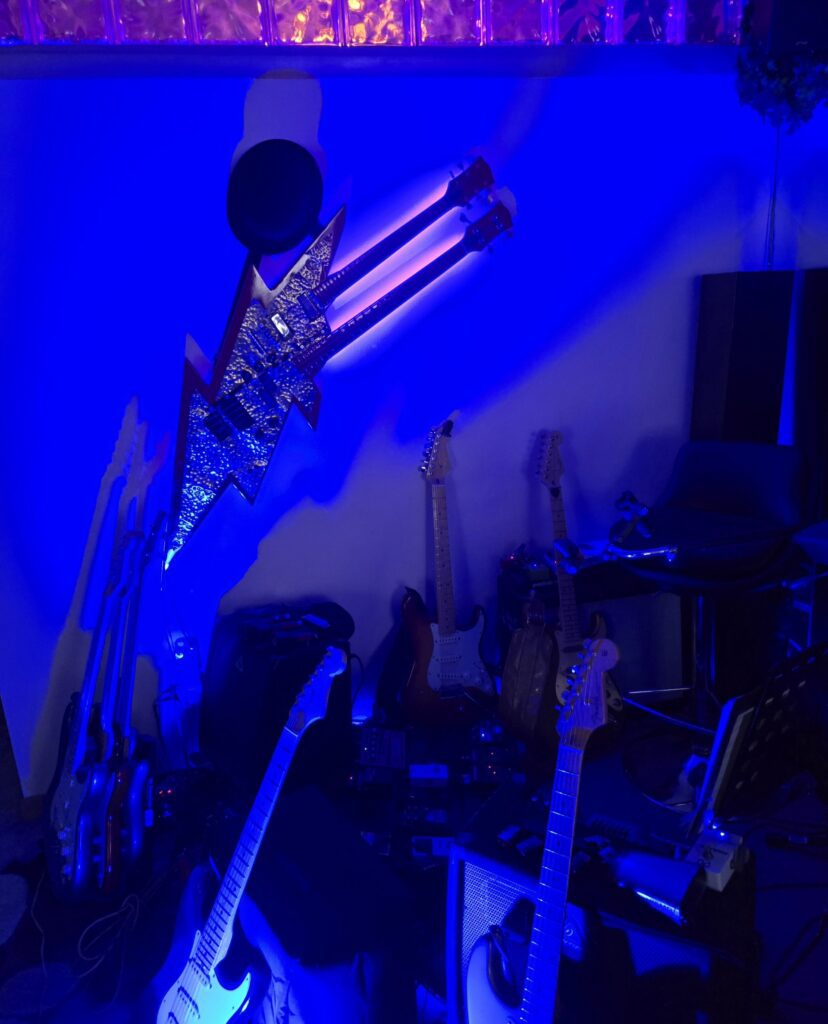
A cool set ender was Bob and I playing my lightning bolt at the same time on the same guitar, then rolling backwards together into a slow somersault, guitar and all. It sounded like a train wreck but the audience loved it! Nobody else was doing that kind of stuff back then and I was so proud to be doing something very different from what the other bands were doing. The agents began to notice us and I formed a great friendship with all the mainstream Chicagoland club owners where we were playing. I was doing all the booking and the owners knew that Horace Monster was the most reliable band in town who never cancelled a date for any reason. When I booked a date it was “etched in stone” and we had unconditional trust in each other. Toward the end we didn’t even need contracts, just a handshake when together we marked “Horace Monster” in ink on our personal calendars.
At that time I had moved into my small 1966 Dodge van as my permanent residence to save money. Spending 2 Chicago winters I called it “city camping” that to me seemed like a fun adventure. Anywhere I parked and turned off the engine I was home! For me it was reminiscent of having the military discipline that I had learned when I was in the Air Force. (Episode #3 of “Talk A Blues Streak” podcast)
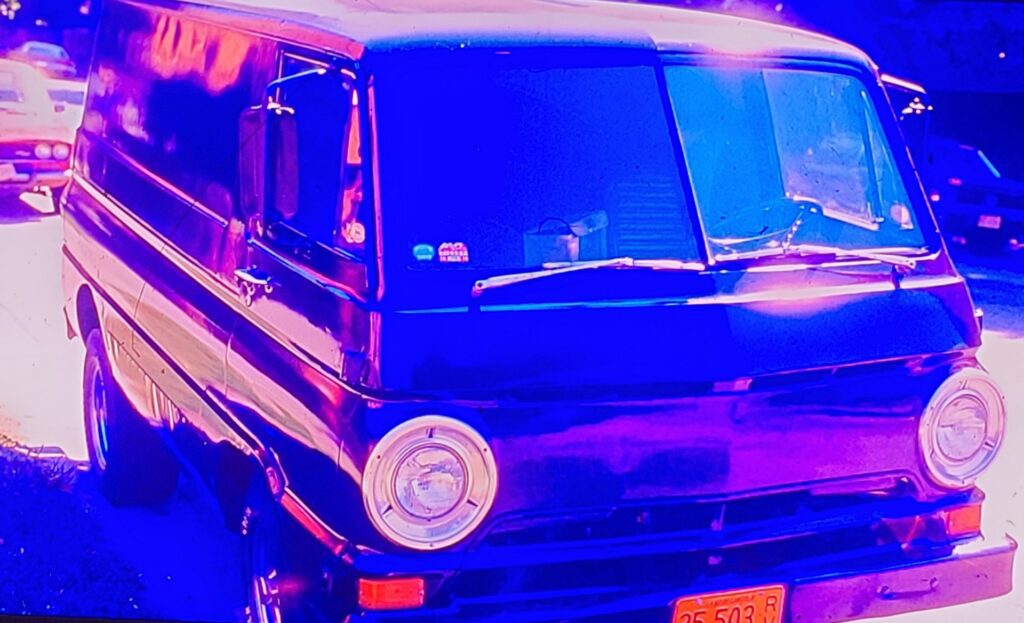
In retrospect I’m guessing that around this time my band must have thought that I was somehow withdrawing and becoming more and more distant. On the contrary the freedom of living in my van inspired me and I was actually writing lots of songs on my acoustic guitar and couldn’t wait to unveil them. Perhaps my band thought that I was planning some kind of solo career and they better beat me to the punch and cover themselves before they were out of a job. I thought I knew them well but it’s hard to know what they might have been thinking.
Still, I was trusting and naïve and I didn’t see a storm brewing above. Then without my knowledge there seemed to be rumblings in the ranks. For some reason, I still can’t figure out, they wanted to play hard ball and assume total control of the group. At that time the guys for some reason thought that “back stabbing” was now in fashion and really a cool thing. They may have been influenced by events like John Fogerty leaving Creedence Clearwater high and dry as well as multiple guitarists leaving Lynyrd Skynyrd. Extreme measures to get ahead at any cost seemed to be their new mission.
Their first step was cleverly trying to get me to quit the band by calling a prearranged meeting on the premise of a “strategic planning session” by yet another “wanna be” manager to insult and belittle me in front of my bandmates. Collectively they said my influences of the musicians that I respect are in bad taste to try to make me feel ashamed. They were referring to my idols like Harvey Mandel and all my black blues influencers that inspired me and I emulated. My bandmates laughed at me and said I should be emulating people with a completely different direction that they wanted to hear like John McLaughlin and Al Di Meola, but I stayed true to myself and stood my ground because I believed different musical influences result in a more interesting and innovative output.
Their next subversive strategy was to get me to agree to use a REAL “booking agent” to book gigs since he might do a better job of finding new places to play. That seemed like something reasonable to try and since I suspected nothing I agreed. Their long-premeditated plan was in motion and ready to execute while I was clueless simply lost in my happiness.
Since trying to get me to quit didn’t work, running out of ideas and unbeknownst to me they pulled the trigger on their final one. In a very agressive move, they decided to kick Horace out of Horace Monster, but still planned to keep the band name since Horace Monster was already established and had a great track record. Because I was always brutally honest with them about everything, so they knew that I had not copyrighted or filed a trademark registration for the band name. They interpreted my unconditional trust for weakness. I never would have suspected they would do something as brutal as this, but I later learned that it was planned many months in advance. Maybe they thought that nobody would notice that Horace wasn’t in Horace Monster any more!
One night after a great gig in the middle of January during a snow storm way up at the top of the state in Marquette Michigan, we took the long ride back to Chicago after loading up the truck. The usual friendly conversation and critique of the last gig we usually talked about on the van ride back home had suspiciously stopped. Nobody would make eye contact with me and I suddenly felt like I was on the outside looking in and didn’t know what was going on. When we got back to Chicago I turned on the heat in my comfy van and crawled in to go to sleep. There was a loud knock on the van back door when yet another new almost agent squeezed into my van and said we have to talk. He was shaking and sweating and I asked him if he was sick. Choaking up he could hardly talk, then he finally got his words out as I tried to comfort him with my hand on his shoulder. He held his breath then gathered his courage announcing that the band was kicking Horace out of Horace Monster. I asked him why we all couldn’t simply sit down at a table for 10 minutes and let the other guys just tell me what’s going on. After all, we were bonded friends for life after the last 7 years of brotherhood sharing our deepest thoughts and secrets, making a living together and always looking out for each other. He said no, “they don’t want to talk to you” as he abruptly left. I was confused, blindsided, and heartbroken after being unceremoniously sacked and sabotaged. That was the last time I ever talked to any of them since that just didn’t seem to be the kind of thing that close friends do to close friends. Who does that??
Trying to make sense out of everything and thinking back, I realized that for one thing with only land-lines in those days, there was really no good way to communicate and stay on top of things. I realized that Horace Monster’s new inexperienced agent had been hired behind my back long before I had agreed. The band’s calendar was full for the future months and when I would ask for new dates they said “don’t worry about it” because we should take some time off to write some new songs. It turns out that each club that I had worked so hard establishing a working relationship with each club owner had been completely derailed and unsalvageable. The new agent had booked new jobs but did not tell the club owners that I was now out of the band. It was only obvious at show time as they burned out each gig one by one. I was in a powerless position as they played each club date, not being able to re-book future return gigs without Horace. The story that I got much later was when the club owners asked where Horace was, without missing a beat the snippy agent answered that I had simply lost interest and had quit playing music. To this day I have no idea what members were in that version of the band since I had never met any of them.
Reminiscing now I think the saddest thing about their collective decision to burn all those bridges was that today we still could be playing summer festivals of original local nostalgia revival bands. Current agents still call me to tell me we were a strong enough local force to do these gigs. They ask me if there is any chance they could book the original Horace Monster with the original members? They say the money would be great and give the examples of mostly still working groups for special occasions and nostalgia concerts ..AKA: “Shadows of Night”, “REO Speedwagon”, “Cryan Shames”, “The Buckingham’s”, “The Flock”, “Ides of March”, “New Colony Six”, “Mason Profit” “Styx” and of course “Cheap Trick” who we used to alternate sets with at a place called the Night Gallery in Park City until 5 AM back in the day in a different century.
After getting sacked I wasn’t fond of band mentality so I played my songs acoustic solo alone in small restaurants, while the new band without Horace burned the bridges for return dates that ran out in about a year. But playing solo, I missed the electric music and especially playing lead guitar and blues harmonica.
Q: Tell me about the second lineup of Horace Monster, maybe restarted in the 80's as per your YouTube video I saw from 1981.
Billy Prewitt: Well, I guess you would call this the beginning of the 3rd lineup so far. When the dust settled from the coup d’état I decided to lead a new power trio and re-resurrected Horace Monster since it was my name and my concept from the beginning. More importantly I also learned my lesson about my collective way of thinking allowing the band to be a democracy with equal votes. A band that is a democracy simply does not work because it slows progress and pulls the group in different directions without a clear leader to guide the band. I made it clear in the new trios who was the leader and if they wanted to vote, everybody could vote. The only difference was that now my vote was the only vote that counted. I paid the rhythm section different amounts of money and told each band member exactly what they would be getting paid, a technique that I learned from Otis Rush when he paid his band. Surprisingly, in the new hierarchy there were never any questions or problems after that it was more fun.
It was the perfect time to launch a power trio. On the horizon was ”ZZ Top”, “Cream”, and “Hendrix”. The first version of the new power trio was with the late Tommy Palmer on bass with very soulful vocals, and the late Les King on drums. They had been playing together as a power trio in a great band called “Sunday Funnies” so I stole them from that band since they were anxious to be a part of Horace Monster. Another version of the 3-piece power trio was with Tom Hagerty on bass and Jody Jones on drums. Both of them are still playing and we are great friends that I have tremendous respect for. Another version was with Craig Sims on bass and Larry Lamas on drums, still close friends with them too. The 3 piece was a lot of fun for me and we had plenty of gigs taking jobs and competing with groups that had many more members.
Q: What are all members doing now?
Billy Prewitt: If you are asking about the original 4-piece band, in my last conversation with the late Cliff Johnson a few days before he died (leader of Off Broadway), Cliff told me that Bob Harding is living somewhere in Lake Geneva and relocated there to ride on Cliff’s coat tails. I think Bob was with Cliff’s band “Off Broadway” for a very short time because Off Broadway turned over personnel often. Keyboardist Eldon Olmstead I’ve heard he is living in a suburb who offered his apologies for “the part he played in the Horace Monster Coup”. The drummer who was known as Phil Alexander immediately disappeared off of the face of the earth I’m guessing was somehow trying to evade the law. He was always my roommate when we traveled on the road when Horace Monster had enough money to get separate motel rooms, but he was always distant and didn’t disclose much of his personal past always being secretive. I was told that Phil Alexander wasn’t his real name and I don’t know where he is.
Q: Are there any crazy tales of excess? Ha
Billy Prewitt: Yep…a few Ha! I remember one when we had a regular “house gig” back in the day when a band could play all week at one club, one of them being a place called “Grannies” in Glen Ellyn. It was great being house band because we could leave the gear onstage all week and didn’t have to load up every night. One night a gorgeous fan came back to the dressing room and offered to share her doobie with me. Little did I know that it was apparently laced with some sort of animal tranquilizer so unknowingly I took a few tokes. Nobody else in the band would try it but soon my knees were giving way as the club owner came back and said it was time to go up for the last set of the night. Since I had quickly achieved the maximum buzz, couldn’t walk, and I was the lead guitar player my band creatively grabbed a dolly used for the beer kegs and picked me up like a stack of loose pony kegs. They told me to hold on and made a ceremony out of my stage entrance when they wheeled me out through the crowd and lifted me up putting me down on my guitar amp where I wouldn’t fall and hurt myself. The crowd applauded and thought it was part of the act. I counted off the set and let’s just say that I’m glad there wasn’t Facebook live back then. It wasn’t one of my best performances so I was sure not to make that mistake again
Q: Is there any other info that you think is important?
Billy Prewitt: Well Steve, in closing I think there are a few loose ends here worth mentioning, because these days I’m proud to say it has been an interesting journey by having gone “full circle and then some”. From the very beginning starting my musical education being mentored by Otis Rush, then preforming on hi-heeled Rock and Roll shoes, and finally landing back on my feet where I started, and now becoming completely dedicated to blues then and now. I feel really at home with “3 cords and the truth”.
In my travels the late Bobby Enriquez who was a jazz piano heavyweight would ask me when we would jam why I would insist on playing blues licks and simple changes. I would answer that I find beauty in simplicity and uncomplicated, uncluttered honesty in that music. He would answer “Well if you want to stay in 5 grade the rest of your life it is your choice”. But I feel most at home with my blues friends that are mostly black and loyal and I’m happy to stay where I am musically with what I know. They would never execute a coup d’etat on their leader. It is actually the opposite as they simply respect age no matter what the players current ability might be. The guys in my original Horace Monster band used to say my “music theory” was playing “minor cords in a major world” but I was always happy to try to be unique and true to myself. There is nothing like the beauty of repetition. I find it hypnotic!
There is a documentary online about my life that I was lucky enough to win an Emmy award for, thanks to producer Hector Perez and executive producer Linda Melazzo. It is the only blues documentary to ever win an Emmy, so I feel extremely honored. All of that information is on my website at BillyPrewitt.com and I love friend requests on Facebook. I’m proud of my podcast too. You can catch it on all major platforms wherever you get your podcasts from if you search for Billy Prewitt or “Talk a Blues Streak”. The episodes are short 20-minute stories sort of like a colorful audio storybook, stopping off at the places I’ve been & everywhere in between that I want to share with everybody. Each episode of the podcast ends with an original song I wrote about the story told. Listen & follow for free with no commercial interruptions. I’ve got 100 episodes in me but I’ll be 80 in August so I’m not sure I can squeeze it all in this life, but check out the existing stories so far.
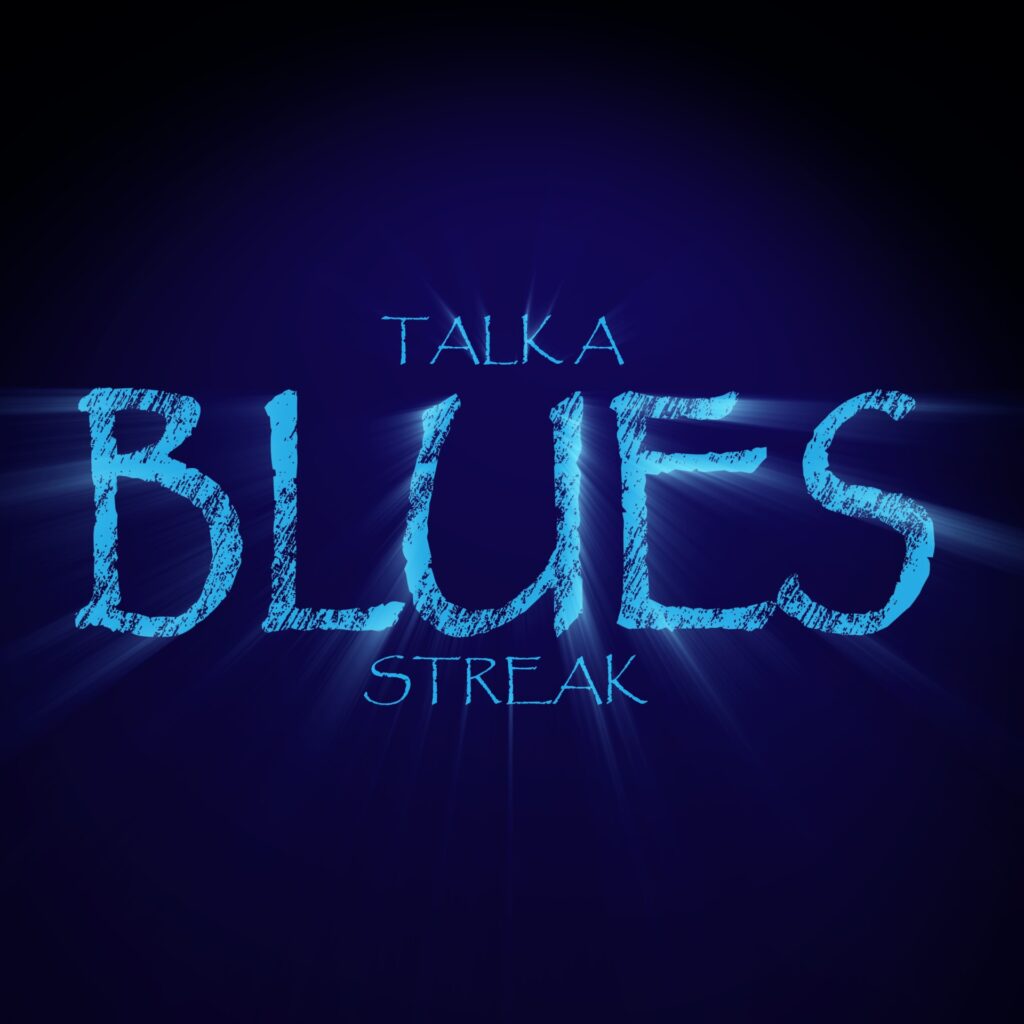
I have had a great life and I’m grateful for all of the people who have been a part of it, embracing all experiences since those acquaintances have made me the person that I am today. It’s been a fun adventure and today when I am playing live and get a request to play “the best thing Billy Prewitt has ever done,” I say “the best is yet to come.” So here we are over a half century later in 2025 and I guess what goes around comes around. I’ve never carried a scorecard in my wallet but it appears that in my little troop I’m the last one standing. Perseverance goes a long way.
